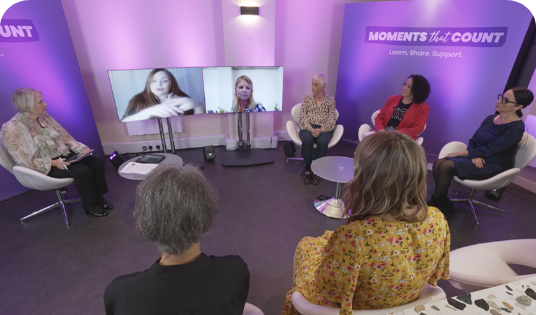Your next appointment
Helping you to make the most of your time with your healthcare team
Moments That Count has been developed and funded by Novartis Pharmaceuticals UK Limited and is intended for a UK general public audience.
Helping you to make the most of your time with your healthcare team
During appointments with your healthcare team, there will be a lot of information passed onto you. Depending where you are on your journey, you could be learning about any upcoming tests, treatments options, introductions to new healthcare professionals and more. It’s important that you go to each appointment prepared. Read on for tips and advice and download our guide, ‘Preparing for appointments’ for guidance on appointments with your cancer team.
Different breast cancer treatments affect your body in different ways, so you should think about how you want to feel and what you would still like to be able to do. Some treatments may cause side effects. You should speak to your healthcare professional at your breast cancer appointment to find out what treatments are available to you, and you should ask them what they will do to your body.

Before you start a new treatment, you may find it helpful to get as much information from your care team as you can. Your doctor should be able to tell which treatments are suitable and give you an idea of the severity of side effects and potential benefits. The decision lies with you and no decision will be final without your consent.
Here are some examples of questions you can ask your doctor about your treatment:
When discussing with your healthcare team, you may want to focus on the things you enjoy and what you would like to achieve, as well as your current living situation so that these can be taken into account when deciding your treatment plan. Indeed, some treatments have more severe side effects than others and considering how they will affect your day-to-day life and how to manage them may help determine a treatment better tailored to your needs. No one side effect is certain when you receive a cancer treatment, therefore healthcare professionals can only give you a list of most likely or most commonly experienced symptoms.
Each person living with breast cancer has a unique story to tell. Sometimes, the stories we read in the news or online do not reflect the journey many people living with primary or secondary breast cancer have experienced.
The Moments That Count breast cancer campaign hopes to raise awareness of what it’s truly like to live with this disease and features contributions from some inspirational women with breast cancer who have shared their very own moments that count from their journeys.

In the matter of discussing treatments for your secondary breast cancer, you may want to consider asking your doctor about the overall survival benefit of any breast cancer treatments they recommend. This is because some treatments can work to keep you alive longer, however reduce your quality of life and therefore your ability to carry on as close to normally as you might like. It’s important to seriously consider how you want to spend your days in treatment.
Overall survival (or OS) is the length of time, from either the date of diagnosis or the start of treatment for a disease, that patients diagnosed with the disease are still alive.2
Alistair provides insight into why it is important to develop a good relationship with your healthcare team and how this can lead to successful management of your condition.
Throughout your journey, you will meet lots of different healthcare professionals who each fulfil a role in your care. Once your diagnosis is confirmed, you will be introduced to a specialist team, which is known as a multidisciplinary team or MDT.
If you would like to read more about the type of support you should be receiving for your cancer care, including the healthcare professionals that should be assigned to you, visit Macmillan Cancer Support.

Surgeon³
Specialises in breast cancer surgery and may do reconstruction surgery.

Plastic surgeon³
Specialises in breast reconstruction.

Cancer doctor (oncologist)³
A doctor who specialises in treating cancer with chemotherapy and other cancer drugs.

Specialist nurse³
Gives information and support.

Radiologist³
Specialises in x-rays and scans.

Pathologist³
Specialises in studying tissue samples and cells.

Patients support groups³
While not a part of your professional MDT, there are plenty of other groups you can talk to. Patient support groups are a fantastic place to find people in a similar situation to yourself to share support, knowledge, tips, advice and stories. Learn more about patient support groups here.
Learn more about...

Primary and secondary defined
Learn the general and more specific symptoms of primary and secondary breast cancer.

Crucial conversations in breast cancer
Watch our Novartis-funded panel discuss… the importance of two-way dialogue in breast cancer care.

Biomarkers guide
Read the biomarkers guide to understand the role they play in treatment options.
References
UK | October 2025 | 284560-1
Please take a moment to complete the following - it’s completely anonymous so none of your personal data is stored. All responses will be pooled together and the collective results will be studied by Novartis so we can continually improve our information and resources for patients.
Moments That Count has been developed and funded by Novartis Pharmaceuticals UK Limited. It has been created in collaboration with secondary breast cancer patients whose knowledge and insights have informed the content and direction for the campaign.
This website is part of a programme that is funded by Novartis Pharmaceuticals UK Limited. Novartis Pharmaceuticals UK Limited is a private limited liability company registered in England and Wales under number 119006. Registered office 2nd Floor, The WestWorks Building, White City Place, 195 Wood Lane, London, W12 7FQ. Use of this website is governed by our Terms of Use and the Cookies and Privacy Policy.
Reporting side-effects
If you get side effects with any medication you are taking, talk to your doctor, pharmacist or nurse. This includes any possible side effects not listed in the information leaflet that comes in the pack. You can report side effects via the Yellow Card Scheme at www.mhra.gov.uk/yellowcard. By reporting side effects, you can help provide more information on the safety of your medication.
©2024 Novartis Pharmaceuticals UK Ltd - UK | April 2025 | 124182-5 This site is intended for a UK general public audience.
